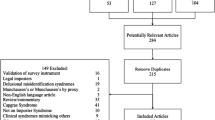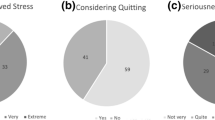Abstract
Stigma refers to the negative attitudes, beliefs, and stereotypes associated with certain individuals or groups based on specific characteristics, behaviors, or conditions. The current study aims to investigate the social stigma attitude, specifically fear and discrimination, among healthcare employees in Pakistan during the COVID-19 pandemic. Data was collected from employees working in the health sector, including public and private hospitals in the Khyber Pakhtunkhwa Province of Pakistan. Convenient sampling technique was employed, and a total of 280 responses were collected and analyzed. The study utilized constructs adopted from previous research to assess the reliability of the data through Cronbach’s alpha. Data analysis was performed using the latest version of SPSS. Statistical procedures such as correlation and regression tests were applied to derive meaningful information from the data. Additionally, mediation analysis using the Process macro was conducted to examine the impact of fear and discrimination stigma on employee performance. Employee performance was measured based on fatigue, emotional exhaustion, burnout, and satisfaction at the workplace. The findings revealed that fear stigma at work and stigma discrimination at work are positively and significantly associated with fatigue (β = 0.251, t = 2.134, p < 0.05) and (β = 0.369, t = 3.287, p < 0.01) respectively. Similarly, fear stigma at work and stigma discrimination at work are positively and significantly associated with employees’ emotional exhaustion (β = 0.180, t = 1.903, p < 0.1) and (β = 0.545, t = 6.060, p < 0.01) respectively. This implies that as levels of fear stigma and stigma discrimination at work increase, emotional exhaustion also increases. However, psychological empowerment is not a significant predictor of employees’ emotional exhaustion (β = 0.089, t = 1.259, p > 0.1). Furthermore, stigma discrimination at work is negatively and significantly associated with burnout (β = − 0.597, t = − 4.417, p < 0.01), indicating that as levels of stigma discrimination at work increase, burnout levels decrease. Psychological empowerment is not a significant predictor of burnout (β = 0.045, t = 0.426, p > 0.1). Based on the results, it is recommended to implement measures to reduce stigma among healthcare workers, especially those who work with highly infectious patients. The study findings highlight the significant role of stigma as a predictor of burnout, compassion fatigue, and compassion satisfaction among healthcare workers. Addressing stigma can contribute to improving the well-being and performance of frontline care providers.

Similar content being viewed by others
Data availability
The data is available in the online repository of www.ustb.edu.pk.
References
Banks S, Clegg CW, Jackson PR, Kemp NJ (2015) Discrimination, work and wellbeing: a longitudinal study of Australian working adults. J Occup Health Psychol 20(3):314–325. https://doi.org/10.1037/a0038733
Buselli R, Corsi M, Baldanzi S, Chiumiento M, Del Lupo E, Dell’Oste V, Carmassi C (2020) Professional quality of life and mental health outcomes among health care workers exposed to Sars-Cov-2 (Covid-19). Int J Environ Res Public Health 17(17):6180
DeLuca HK, Johnson SL, Huth MC (2020) Stigma, resilience, and burnout among healthcare workers during the COVID-19 pandemic. J Hosp Admin 9(2):131–137. https://doi.org/10.5430/jha.v9n2p131
Demirtaş-Madran HA (2020) Exploring the motivation behind discrimination and stigmatization related to COVID-19: a social psychological discussion based on the main theoretical explanations. Front Psychol 11:569528
Du J, Dong L, Wang T, Yuan C, Fu R, Zhang L, Yin Y (2020) Psychological symptoms among frontline healthcare workers during COVID-19 outbreak in Wuhan. Gen Hosp Psychiatry 67:144–145. https://doi.org/10.1016/j.genhosppsych.2020.03.011
Fitzpatrick KM, Harris C, Drawve G (2020) Fear of COVID-19 and the mental health consequences in America. Psychol Trauma Theory Res Pract Policy 12(S1):S17–S21. https://doi.org/10.1037/tra0000924
Ghabrial MA (2017) “Trying to figure out where we belong”: narratives of racialized sexual minorities on community, identity, discrimination, and health. Sex Res Soc Policy 14:42–55
Hannemann J, Abdalrahman A, Erim Y, Morawa E, Jerg-Bretzke L, Beschoner P, Albus C (2022) The impact of the COVID-19 pandemic on the mental health of medical staff considering the interplay of pandemic burden and psychosocial resources—a rapid systematic review. PLoS One 17(2):e0264290
Hansson L, Jormfeldt H, Svedberg P, Svensson B (2013) Mental health professionals’ attitudes towards people with mental illness: do they differ from attitudes held by people with mental illness? Int J Soc Psychiatry 59(1):48–54
Hossain I, Mehedi N, Ali I, Azman A (2023) Occupational health of frontline workers during the COVID-19 pandemic: is health and well-being an issue in Bangladesh? Revista de CercetaresiInterventieSociala 80:18–39
Kaur R, Sharma M (2020) Impact of COVID-19 on health workers: a cross-sectional study. J Fam Med Prim Care 9(11):5620–5624. https://doi.org/10.4103/jfmpc.jfmpc_1683_20
Khan IU, Amin RU, Saif N (2022) Individualized consideration and idealized influence of transformational leadership: mediating role of inspirational motivation and intellectual stimulation. Int J Leadersh Educ 3:1–11
Khanal P, Devkota N, Dahal M, Paudel K, Joshi D (2020) Mental health impacts among health workers during COVID-19 in a low resource setting: a cross-sectional survey from Nepal. Glob Health 16:1–12
Kossek EE, Thompson RJ, Lawson KM, Bodner T, Perrigino MB, Hammer LB, Moen P (2019) Workplace incivility and its negative impact on well-being: a moderated model of job demands and resources. J Occup Health Psychol 24(2):131–145. https://doi.org/10.1037/ocp0000113
Lai J, Ma S, Wang Y, Cai Z, Hu J, Wei N, Hu S (2020) Factors associated with mental health outcomes among health care workers exposed to coronavirus disease 2019. JAMA Netw Open 3(3):e203976–e203976. https://doi.org/10.1001/jamanetworkopen.2020.3976
Mascayano F, Van der Ven E, Moro MF, Schilling S, Alarcón S, Al Barathie J, HEROES group (2022) The impact of the COVID-19 pandemic on the mental health of healthcare workers: study protocol for the COVID-19 HEalthcaRewOrkErS (HEROES) study. Soc Psychiatry Psychiatr Epidemiol 57(3):633–645
Ong JJY, Bharatendu C, Goh Y, Tang JZY, Sooi KWX, Tan YL, Ho RCM (2020) Headaches associated with personal protective equipment—A cross-sectional study among frontline healthcare workers during COVID-19. Headache 60(5):864–877. https://doi.org/10.1111/head.13811
Patel BR, Khanpara BG, Mehta PI, Patel KD, Marvania NP (2021) Evaluation of perceived social stigma and burnout, among health-care workers working in Covid-19 designated hospital of India: a cross-sectional study. Asian J Soc Health Behav 4(4):156
Preti E, Di Mattei V, Perego G, Ferrari F, Mazzetti M, Taranto P, Madeddu F (2020) The psychological impact of epidemic and pandemic outbreaks on healthcare workers: rapid review of the evidence. Curr Psychiatry Rep 22(8):43. https://doi.org/10.1007/s11920-020-01166-z
Radhakrishnan RV, Jain M, Mohanty CR, Jacob J, Shetty AP, Stephen S, Issac A (2021) The perceived social stigma, self-esteem, and its determinants among the health care professionals working in India during COVID 19 pandemic. Med J Armed Forces India 77:S450–S458
Ramaci T, Barattucci M, Ledda C, Rapisarda V (2020) Social stigma during COVID-19 and its impact on HCWs outcomes. Sustainability 12(9):3834
Ransing R, Ramalho R, de Filippis R, Ojeahere MI, Karaliuniene R, Orsolini L, Adiukwu F (2020) Infectious disease outbreak related stigma and discrimination during the COVID-19 pandemic: drivers, facilitators, manifestations, and outcomes across the world. Brain Behav Immun 89:555
Saeed F, Mihan R, Mousavi SZ, Reniers RL, Bateni FS, Alikhani R, Mousavi SB (2020) A narrative review of stigma related to infectious disease outbreaks: what can be learned in the face of the Covid-19 pandemic? Front Psych 11:565919
Saif N, Shaheen I (2022) Investigating the relationship between the big five personality traits model and selfie posting behavior with the moderating role of culture and marital status among university students. J Innov Res Manag Sci 3:1–15
See LC, Shen YM, Chen CL, Huang TM, Huang YH, Huang HC, Lin SR (2011) Professional attitude of health care workers toward serving HIV/AIDS patients and drug users: questionnaire design and evaluation of reliability and validity. AIDS Care 23(11):1448–1455
Simms L, Ottman KE, Griffith JL, Knight MG, Norris L, Karakcheyeva V, Kohrt BA (2023) Psychosocial peer support to address mental health and burnout of health care workers affected by COVID-19: a qualitative evaluation. Int J Environ Res Public Health 20(5):4536
Sims OT, Gupta J, Missmer SA, Aninye IO (2021) Stigma and endometriosis: a brief overview and recommendations to improve psychosocial well-being and diagnostic delay. Int J Environ Res Public Health 18(15):8210
Singh R, Subedi M, Sunar CB, Pant S, Singh B, Shah B, Mahato S (2021) Association of social stigma of COVID-19 with work satisfaction, burnout and fatigue among healthcare workers in Nepal. Global Psychiatry Arch 4(2):180–190
Smith TD, DeJoy DM, Dyal MA, Huang G, Griffin-Blake CS (2020) Racism, stigma, and work stress among African American employees: a latent profile analysis. J Occup Health Psychol 25(5):340–353. https://doi.org/10.1037/ocp0000171
Stangl AL, Earnshaw VA, Logie CH, Van Brakel WC, Simbayi L, Barré I, Dovidio JF (2019) The health stigma and discrimination framework: a global, crosscutting framework to inform research, intervention development, and policy on health-related stigmas. BMC Med 17:1–13
Teksin G, Uluyol ÖB, Onur ÖS, Teksin MG, Ozdemir HM (2020) Stigma-related factors and their effects on health-care workers during COVID-19 pandemics in Turkey: a multicenter study. ŞişliEtfalHastanesi Tip Bülteni 54(3):281–290
Thomas TL, Muliyala KP, Jayarajan D, Angothu H, Thirthalli J (2019) Vocational challenges in severe mental illness: a qualitative study in persons with professional degrees. Asian J Psychiatr 42:48–54
Wang Y, Zhang X, Li Y, Xia L, Liu Y (2020) The psychological impact of COVID-19 pandemic on medical staff in Guangdong, China: a cross-sectional study. Psychol Med. https://doi.org/10.1017/S0033291720003119
Yahemba D, Chowdhury S, Olorunfemi T, Dubukumah L, David A, Umunnakwe C, Dean L (2023) Exploring the impact of COVID-19 on frontline health workers through a photovoice study in Kaduna, Kwara and Ogun States, Nigeria. Int Health 15(Supplement_1):i110–i125
Zhang W, Yang X, Zhao J, Yang F, Jiao M, Zhou Q, Wang X (2021) Association of fear and stigma with COVID-19 related factors among medical staff in China. Front Psychol 12:646157. https://doi.org/10.3389/fpsyg.2021.646157
Zhou J, Liu L, Xue P, Yang X, Tang X, Yang T (2020) Mental health response to the COVID-19 outbreak in China. Am J Psychiatry 177(7):574–575. https://doi.org/10.1176/appi.ajp.2020.20030304
Author information
Authors and Affiliations
Contributions
1Naveed Saif: Being a first author, I have initiated the whole study and performed the critical analysis of the paper. Moreover, I wrote the first draft of the paper as well. I have also formulated research goals and aims of the paper. 2Imrab Shaheen: Formal Analysis is performed by this author. Literature Review and Introduction section was written by this author. 3Sajid Ullah Khan: Corresponding Author of the manuscript. Moreover, measurement and data collection were performed by Sajid Ullah Khan. 4Faheem Khan: Generation of image dataset and its training and testing are performed by Faheem Khan. 5YoungmoonLee: Regression analysis were performed by this author. 6Jawad Khan: Validation and verification the results are done by Jawad Khan. Visualization Preparation, of the published work, specifically data presentation are done by this author.
Corresponding authors
Ethics declarations
Conflict of interest
The authors declare no competing interests.
Additional information
Publisher's Note
Springer Nature remains neutral with regard to jurisdictional claims in published maps and institutional affiliations.
Rights and permissions
Springer Nature or its licensor (e.g. a society or other partner) holds exclusive rights to this article under a publishing agreement with the author(s) or other rightsholder(s); author self-archiving of the accepted manuscript version of this article is solely governed by the terms of such publishing agreement and applicable law.
About this article
Cite this article
Saif, N., Shaheen, I., Khan, S.U. et al. Investigating the dynamic relationship between stigma of fear, discrimination and employees performance among healthcare workers during Covid-19 pandemic. Cogn Tech Work 25, 385–395 (2023). https://doi.org/10.1007/s10111-023-00732-8
Received:
Accepted:
Published:
Issue Date:
DOI: https://doi.org/10.1007/s10111-023-00732-8




